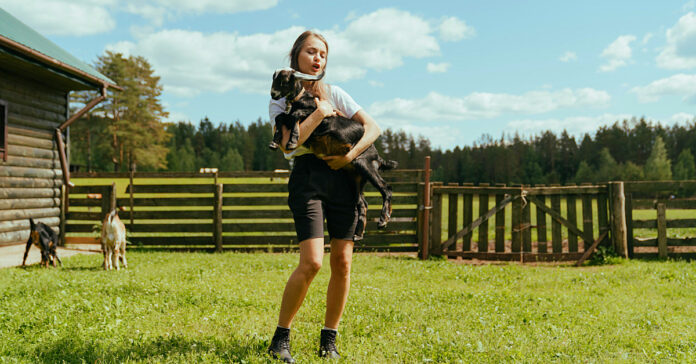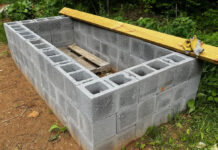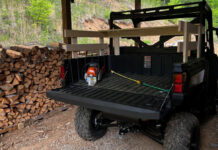If you read our 2023 predictions, you’ll understand why I think you should get out of the city and move somewhere with a much lower population density before it is too late. While you can prep in the city and the suburbs, surviving there is going to be difficult when the utilities go out for good, the police and firefighters don’t respond, and an orgy of looting strips the food from the store shelves.
You will be safer in a rural location well off the Interstate with land upon which you can raise crops or livestock. Ideally, your new place will have a source of surface water you can filter and drink, and an option to heat with wood. If you are willing to work at it, moving to such a location will increase your odds of living through any serious disruption and continuing to survive well after the fact. In a remote location, you and yours will have a better chance to live until society and civilization reboots or a new one evolves.
It can be tough to make that break and leave behind the city or suburbs and all their opportunities and excitement. I get it because I’ve been there, done that. I made the trip from New York City to the side of a mountain in the middle of nowhere in a series of steps. These days, I think it might be too late to do it in steps. You need to take the plunge.
For many, the biggest obstacle is fear of the unknown. When your fear of surviving a calamity in the city exceeds your fear of starting over in the country, you will be ready to move.
The next obstacle is money. How can you make an income in the middle of nowhere? Let’s talk about that.
The Good News
With the growing number of jobs allowing people to work from home, you may keep much of your income even after a move. That makes starting a homestead much easier because it subsidizes it. All you need to work remotely is high-speed internet and an occasional trip to the airport.
When you are ready to move, you have to break free from all those material things you have in the city, all the cultural activities, the concerts you go to, and the vacations you take. When you move to the country, you should no longer need to “get away from it all” unless you want to get away from the winter weather.
As long as you do your part, living in a small town, village, or rural area is much less expensive than living in the big city. Of course, to save money, you have to accept that you will be living a simpler life. You have to leave behind $15 cocktails for drinks at a friend’s house. There won’t be mass transit or rideshares, but your car insurance will be significantly lower. You won’t be going to go to the dry cleaner, but you might have to string up a clothesline. You will have to trade buying fine leather shoes made in Italy for a sturdy pair of farm boots. If you expect to enjoy fine dining, you better be a good cook.
Sure, there are the tradeoffs, but there are also benefits. You also won’t get mugged, pushed onto the subway tracks, get trapped in an elevator when the power goes out, have to put up with noisy upstairs neighbors clomping around or nosey neighbors who report you to the HOA for using the wrong color hose. It’s safe for your kids to play outside. It’s peaceful and quiet at night (unless you own a rooster).
One Story
There’s a young woman I see around here who always dresses in coveralls and work boots. She and her partner (I have no idea if her partner is male of female–or fictitious–because I’ve never met them), live on a small homestead and sell their produce, honey, beeswax candles, and crafty things at the local farmer’s markets. In the off season, she does odd jobs like painting, and she pops up from time to time working in retail or food service.
That’s not the easiest way to make a living, but she is far from the only one that does it. We know people who homestead on less on than an acre. We deal with a range of locals who have small businesses selling micro greens, mushrooms, baked goods, wooden crafts, art, and other items. I doubt any of them are making a mint, but they are keeping food on the table and gas in the car. They all take Square for payment, but it would not surprise me if a good deal of their cash income doesn’t get reported to the IRS.
I’m relaying this story to make two points:
- If you live a simple life, you can survive on very little income.
- If you are polite, friendly and work hard, you can make it in a rural community.
How to Cut your Expenses
Spend Less on Housing
My first suggestion for how to afford to move to the country is to pay less per month for your housing. For example, the 700-square foot one-bedroom apartment I lived in some 30 years ago now rents for $2,500 or more per month. Out here, that will rent you a three or four-bedroom house. Leave that big $2,500 to $3,500 rent or mortgage payment behind and spend between $1200 and $1400 and get a two-bedroom house on a few acres instead. Or, save even more by renting a mobile home on some acreage until you get settled in. Or buy a fixer-upper. Utilities will be cheaper, too. In fact, water and sewer will be free because you will be on a well and septic.
The other day, we had dinner at the house of another couple; it was 950 square feet, but only after they closed in the screened porch. Like us, they had wood heat, but they burned far less wood than we did because they were heating a smaller area. Because they have outbuildings, like a shed and a shop, they had plenty of room for his tools and storage. Outbuildings are bonus space you don’t pay for. I wish we had some.
Don’t Pay to Exercise
My second suggestion is to cut back on activities you pay for, including kid’s activities like karate and dance. Drop your gym membership and eat out less. Cut back on all your discretionary spending until you have some excess cash and know you are making ends meet.
When you work on a homestead, you’ll get plenty of exercise. You will keep busy and find plenty of ways to entertain yourselves. You’ll sleep better, too. If you go out, you will find tickets to the local community theater is far less expensive than off-Broadway in your old city. Your kids will find plenty of activities, from 4H or Future Farmers of America to school athletics, which can be very competitive.
You can also take advantage of free activities, like hiking and fishing. Our surrounding communities have festivals and street fairs. Kids can even become volunteer firefighters at age 16.
Stop Trying to Buy Happiness
Third, control your consumerism and shop less. This means buy less stuff, buy used stuff when possible, and buy less prepared food. Once you leave the city, you’ll realize that it’s not a competition and you can’t buy the stairway to heaven. Just buy what you need.
For example, cook from scratch, buy less prepared foods, eat your leftovers, and you’ll save money. I’ve had Chinese food in a restaurant only once since we moved, but I find I am just fine without it. If you eat what you grow, you not only save money, but you enjoy the fruits of your labor. For example, I eat eggs at least six days a week. We have two or three bottles of honey on the table. When the garden was producing, we ate zucchini at least twice a week. You’ll find you not only get used to it, but when the zucchini is gone, you’ll look forward to next year’s harvest.
It’s not for Everyone
Not everyone who moves to the country stays there. To be successful, both spouses have to want it and the kids have to be young enough not to complain. For example, I would not yank kids out of high school unless they are fully committed and want to go. Adapting may be tougher on older kids than on adults.
You also must not bring your city ways with you; it has to be a clean break. You have to quickly assimilate, accept and possibly adopt local behavior, be friendly, accept advice, don’t argue or tell a “lifer” how they should do something. Wave to the neighbors; one day, they may wave back. Get out into the community and shop locally.
Don’t complain about what you miss. Instead, celebrate what you have found. If you get off on the wrong foot, word will spread and you may never fit in.
You also have to get used to your family and old friends thinking you are crazy. My wife’s family, who all live in various East Coast cities, know we raise chickens, so they think I am a farmer. I swear they think we have a red barn with silos and I drive a green tractor. Homesteading is a foreign concept to them. Of course, none of them have visited, and I doubt the ever will.
Some of your friends will visit. A few will be envious enough to ask how you did it, but fewer still will follow in your footsteps. On their way home, they will argue about whether they could be happy livings “like that.”
Final Thoughts
If you are serious about prepping and believe we are getting close to a collapse, global war, or other national or global SHTF event, then you have only three choices: build a deep bunking into which you can withdraw for months, move to the middle of nowhere, or move to the middle of nowhere and build a bunker. We picked the second option, and it’s working out for us. Hopefully, you can do the same thing.







